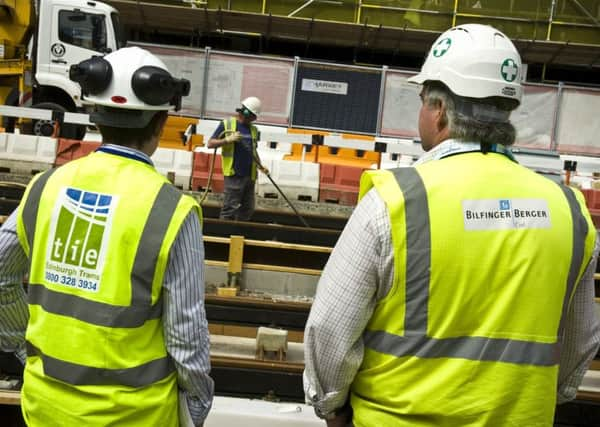Tram inquiry: Contractors '˜forced' to stop Princes Street work before finishing


Martin Foerder, who was drafted in by lead contractor Bilfinger Berger to be project director for the construction consortium, said initially a period of one year was put forward for the works as part of an agreement to break the Princes Street deadlock.
He said work was earmarked to begin on March 23, 2009 and that Bilfinger’s preferred option would have been for this to go all the way through to March 2010, without a break for either the Festival or Christmas.
Advertisement
Hide AdAdvertisement
Hide AdBut the inquiry heard that this ended up changing after tram firm TIE insisted the work was completed no later than November 29.
In his written submission, Mr Foerder explained: “We were therefore instructed to use whatever resources we needed in order to make this happen, including working twenty-four hours a day, seven days a week.
“This is what we ended up doing towards the end of that period. Even then, works were not fully complete in November 2009, and so we had to return in January 2010 to complete the Princes Street Works and to carry out certain remedial works.”
Mr Foerder said they did not have time to install joint filler along the tram rails, which led to cracking because of the load from buses.
Advertisement
Hide AdAdvertisement
Hide AdThe inquiry heard that, on November 29, the road was opened again to traffic just hours after the tarmac had been laid, against the advice of Bilfinger Berger.
When asked if they told TIE that the work would not be finished by the earlier date, Mr Foerder said that they had.
Counsel to the inquiry, Euan Mackenzie QC, said: “Just to be quite clear, the consortium’s recommendation to TIE was: don’t open the road because the works aren’t finished? Is that correct?”
“Yes,” Mr Foerder replied.
He added money could have been saved had TIE opted for Bilfinger’s preferred year-long programme.
Advertisement
Hide AdAdvertisement
Hide AdFurther remedial work was carried out on Princes Street after mediation in 2011 in which layers of asphalt were replaced with concrete. Mr Foerder said the consortium did accept “some responsibility” for the road’s defects.
The former project director was giving oral evidence as the tram inquiry, chaired by Lord Hardie, yesterday began its 14th week of public hearings.
He was also asked about earlier evidence from former TIE chief executive Richard Jeffrey, who told the inquiry that top Bilfinger executive Dr Jochen Keysberg had said the contract allowed them to hold TIE “to ransom”.
Mr Foerder replied: “I don’t recollect that phrase. And we didn’t do that.”
Advertisement
Hide AdAdvertisement
Hide AdHowever, he described a tense relationship with the arm’s length firm, accusing them of having “continually used the public domain and the media to misrepresent what had really happened”.
He told the inquiry: “Over my 30 years of profession, I have never experienced such a client. I have seen some good clients and bad clients. TIE was on the top of the negative scale – completely unreasonable, unprofessional and not acting as a reasonable client.
“The way they behaved was for me something which I hope not to experience again in my professional life.”
Mr Foerder said he also felt the construction contract was signed too soon, when there was still a lot of work to be done on utilities and design.
Advertisement
Hide AdAdvertisement
Hide AdThe inquiry also heard that at the time of contract award the size of the tram vehicle from Spanish firm CAF was bigger than that originally anticipated in the project designs.
Mr Mackenzie said that to a lay person this would appear “a fairly fundamental matter” to be misaligned before awarding a contract. Mr Foerder agreed it did have “quite an impact” and had to be sorted out.